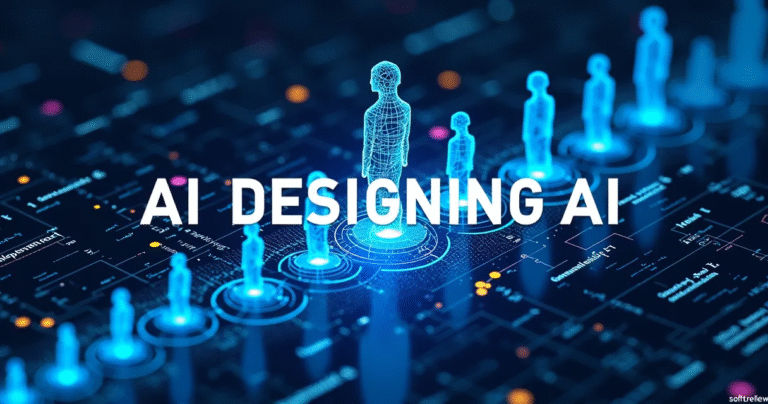Evolutionary Code Design with Gemini
How Google’s AI-powered evolutionary algorithms are revolutionizing software optimization
Evolutionary Code Design
Combines Gemini LLMs with automated evaluators to iteratively mutate and refine algorithms, creating a “survival of the fittest” system for code. This natural selection approach enables algorithms to evolve toward optimal solutions.
General-Purpose Optimization
Enhances data center efficiency, AI training, chip design, and solves open mathematical problems (e.g., faster matrix multiplication algorithms). The system can be applied to virtually any computational challenge requiring optimization.
Minimal Initial Code Needed
Improves from basic code blocks (e.g., single-line functions) using evolve annotations in APIs. Developers can provide simple starting points and let the system iteratively improve functionality through generations of refinement.
Model-Agnostic Architecture
Works with any LLM; current implementation uses Gemini 2.0 but adapts to other LLMs and codebases. This flexibility ensures the evolutionary approach can leverage improvements in foundation models as they emerge.
Real-World Impact
Recovered 0.7% of Google’s global compute resources, saving millions at scale through optimized algorithms. These efficiency gains demonstrate the significant practical value of evolutionary code design in production environments.
Self-Improving Intelligence
Performance scales with LLM advancements, enabling compounding gains in algorithmic innovation. As foundation models improve, the evolutionary system becomes more capable at generating sophisticated optimizations.
AlphaEvolve: DeepMind's Gemini-Powered Agent Designs Advanced Algorithms
In the ever-accelerating world of artificial intelligence, DeepMind has once again pushed the boundaries with its latest creation: AlphaEvolve. This groundbreaking coding agent, powered by Google's Gemini models, is designed to autonomously discover and optimize complex algorithms. Imagine an AI that not only writes code but also evolves it, surpassing human ingenuity in solving intricate problems. This is the promise of AlphaEvolve, poised to reshape algorithm design across diverse fields, including mathematics, computer science, and hardware engineering.
The Algorithm Alchemist: DeepMind's New Creation

AlphaEvolve isn't just another AI tool; it's a sophisticated system capable of generating, evaluating, and refining algorithms through an evolutionary process. Think of it as an algorithm alchemist, turning raw code into optimized solutions. This innovative approach combines the creative power of large language models (LLMs) with automated evaluators, enabling AlphaEvolve to tackle challenges that were once considered the exclusive domain of human experts.
Gemini's Spark: Powering the Algorithm Evolution
At the heart of AlphaEvolve lies the power of Google's Gemini models. These LLMs provide the creative spark, generating a diverse range of potential algorithmic solutions. AlphaEvolve utilizes an ensemble of Gemini models, including the speedy Gemini Flash for exploring a wide range of ideas and the more powerful Gemini Pro for in-depth analysis and refinement. This combination allows AlphaEvolve to explore a vast solution space efficiently, identifying promising candidates for further development.
How AlphaEvolve Turns Code into Gold
AlphaEvolve's magic lies in its ability to autonomously improve algorithms through a continuous cycle of generation, evaluation, and evolution. This iterative process allows it to learn from its successes and failures, gradually refining its solutions to achieve optimal performance.
From Code Generation to Automated Evaluation: The AlphaEvolve Process
The AlphaEvolve process begins with a prompt, which is constructed using previous high-scoring solutions, mathematical context, or code structure. This prompt is then fed into the Gemini models, which generate new programs implementing algorithmic solutions as code. These programs are then evaluated using automated evaluation metrics, providing an objective assessment of each solution's accuracy and quality. This automated evaluation is crucial, allowing AlphaEvolve to systematically compare and rank different solutions.
The Evolutionary Advantage: Learning from Success and Failure
AlphaEvolve employs an evolutionary algorithm to determine which programs will be used for future prompts. The best-performing solutions are selected and used to generate new, improved versions. This process mimics natural selection, where the fittest algorithms survive and pass on their traits to future generations. By continuously learning from its mistakes and building upon its successes, AlphaEvolve gradually evolves towards optimal solutions.
AlphaEvolve's Real-World Impact: From Data Centers to Chip Design
AlphaEvolve is not just a theoretical exercise; it has already demonstrated its practical value by optimizing various aspects of Google's infrastructure and research efforts.
Optimizing Google's Infrastructure: A 0.7% Efficiency Boost
One of the most impressive achievements of AlphaEvolve is its optimization of data center scheduling. By discovering a simple heuristic for task orchestration in Borg, Google's workload management system, AlphaEvolve has recovered an average of 0.7% of Google's overall compute capacity. This may seem like a small percentage, but it translates to significant cost savings and increased efficiency across Google's vast network of data centers.
Hardware Harmony: Designing the Next-Gen TPUs
AlphaEvolve has also made significant contributions to hardware design. By proposing modifications to Verilog, the standard circuit design language, AlphaEvolve eliminated redundancies in a critical arithmetic circuit for matrix multiplication. This proposal was integrated into an upcoming Tensor Processing Unit (TPU), Google's custom AI accelerator, demonstrating the potential for AI to enhance hardware design.
Matrix Multiplication Mastery: Surpassing Human Ingenuity
Perhaps the most groundbreaking achievement of AlphaEvolve is its discovery of a new algorithm for multiplying 4×4 matrices with complex values, requiring only 48 scalar multiplications. This surpasses Strassen's 1969 algorithm, which requires 49 multiplications, marking the first improvement in this area in over 50 years. Furthermore, AlphaEvolve optimized a key kernel used in training Gemini models, resulting in a 23% speedup in that operation and a 1% reduction in overall training time. A GitHub repository even exists where users are attempting to verify this algorithm, further cementing its impact. You can explore the verification of Google DeepMind's AlphaEvolve matrix multiplication algorithm on GitHub.
The Ethical Considerations: Algorithmic Bias and Beyond
While AlphaEvolve holds immense promise, it's crucial to consider the ethical implications of AI-driven algorithm design. Algorithmic bias, for example, could inadvertently be amplified if the training data used to develop AlphaEvolve reflects existing societal biases. It's essential to ensure that AlphaEvolve is developed and used responsibly, with careful attention to fairness, transparency, and accountability.
AlphaEvolve and the Future of AI-Driven Discovery
AlphaEvolve represents a significant step towards a future where AI plays a central role in scientific discovery and technological innovation. Its ability to autonomously generate and optimize algorithms has the potential to accelerate progress in various fields, from mathematics and computer science to materials science and drug discovery.
Democratizing Algorithm Design: Empowering Researchers and Developers
One of the most exciting possibilities of AlphaEvolve is its potential to democratize algorithm design. By providing researchers and developers with a powerful tool for automating the algorithm discovery process, AlphaEvolve could lower the barriers to entry in fields that traditionally require specialized expertise.
The Road Ahead: Expanding Horizons Beyond Math and Computing
While AlphaEvolve has already demonstrated its capabilities in mathematics and computer science, its potential applications extend far beyond these domains. Google is planning to expand AlphaEvolve into fields like material science, sustainability, and even drug discovery. Anywhere that involves algorithmic complexity and measurable results is on the table.
The Algorithm's Legacy: A New Era of AI-Driven Innovation
AlphaEvolve marks a pivotal moment in the history of AI. It's not just about automating tasks; it's about creating AI systems that can surpass human capabilities in solving complex problems. As AlphaEvolve continues to evolve and improve, it promises to usher in a new era of AI-driven innovation, transforming industries and pushing the boundaries of human knowledge. The future of algorithm design is here, and it's powered by the ingenuity of artificial intelligence. 🚀







